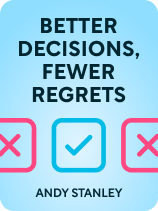

This article is an excerpt from the Shortform book guide to "Better Decisions, Fewer Regrets" by Andy Stanley. Shortform has the world's best summaries and analyses of books you should be reading.
Like this article? Sign up for a free trial here.
What is a good decision, and how do you know you’re making one? What is the best way to evaluate your choice?
A good decision moves you towards your goals and takes your values into account. According to some experts, slow and thoughtful decisions are more likely to do this.
Read on for more on how to recognize good choices.
How to Recognize a Good Decision
We’ve all made decisions that we’re happy with and decisions we’re not so proud of. But few of us have stopped to ask ourselves: What is a good decision? It’s a combination of three factors:
First, a good decision moves you in the direction you want to go, whether in your relationships, career, finances, or another area of your life. A decision that’s right for you makes sense as part of your vision for where you want your life to go.
Second, a good decision accords with your values. A good decision helps you to embody the values that mean the most to you.
Third, a good decision is made purposefully and thoughtfully. We often don’t make good decisions when we feel rushed or if we make a choice without thinking through all the options. A good decision is one that you approach purposefully—by asking yourself a series of questions.
| The Hard Truth About “Good Decisions” We’re all capable of making decisions that get us the results we want. But many experts say it’s more complicated than that. Researchers across many fields study decision-making in different ways. But they tend to agree on one hard truth: A good decision doesn’t necessarily result in a good outcome. They also say it’s not possible to make perfectly rational decisions all the time because of our finite cognitive capacity, the complexity of the situations we face, and practical limits on our time. So how should we approach decisions with these limitations in mind? Many experts have reached a consensus on what they call “decision theory.” This is the idea that we should ask ourselves what we value most and then make a decision that maximizes that outcome. The goal is to weigh your options and choose the one that best suits your values. This approach can often be useful. But sometimes, the relationship between our decisions and our values isn’t quite as linear as this theory suggests. Some philosophers say that decision theory doesn’t account for situations where we don’t know what we care about most or where our values are about to change. This kind of shift in values often occurs when we decide to become parents. In Aspiration, philosopher Agnes Callard argues that we “aspire” to change by learning to appreciate the values we hope to adopt. In other words, we take a leap of faith that we’ll learn to value things we don’t yet appreciate, like evenings spent at home with an infant instead of out with friends. In doing so, we use our decisions to change who we are and what we value most. |
Nobody wants to make decisions they feel bad about later. But even more importantly, the decisions we make for ourselves have consequences for other people, too. For instance, when you decide which university to attend, which job offer to take, or which city to live in, you’re making choices that will affect your family now and in the future. What you do now can affect your community for years to come. Keeping that in mind can help you put your decisions into a perspective that’s bigger than your own.
| Does Slow and Steady Always Win the Race? Researchers say we tend to make our bigger decisions with less deliberation than we put into our smaller decisions, which runs contrary to the advice that a good decision is slow and purposeful. But according to some experts, that’s OK. For example, in Blink, Malcolm Gladwell argues that snap judgments are often just as sound as deliberate decisions. He writes that it’s often less useful to gather all the information and deliberate over it than to let your unconscious mind make a fast and accurate decision. But this doesn’t mean that you can make a good decision without any background knowledge: Gladwell writes that you need to develop the expertise and accumulate the experience that will inform your intuition. On the other hand, in The Signal and the Noise, statistician Nate Silver advocates a slower, more deliberate approach to decisions. Silver explains that many decisions are essentially predictions. He contends that to make good predictions, you have to detect the signal (the relevant information) amidst the noise (the distracting details). Silver advises updating your predictions as you get new information, and becoming more aware of how your assumptions influence your decisions so you can keep one idea from dominating. |

———End of Preview———
Like what you just read? Read the rest of the world's best book summary and analysis of Andy Stanley's "Better Decisions, Fewer Regrets" at Shortform.
Here's what you'll find in our full Better Decisions, Fewer Regrets summary:
- What it means to make a "good" decision
- The three most common categories of bad decisions
- How to overcome your cognitive biases to make better decisions






